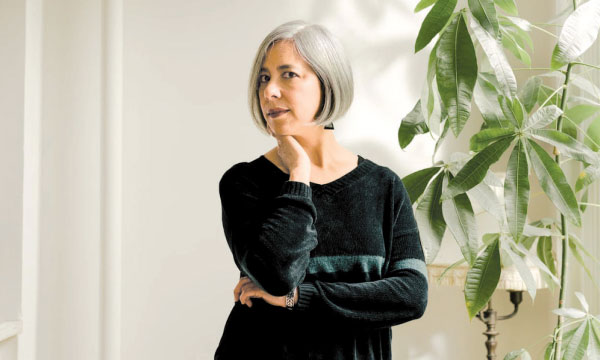Susan Choi is “pretty partial” when describing Trust Exercise, which has won the National Book award for fiction and been a runaway sensation in her native US. “It’s a novel that begins with a group of young people at a performing arts school in the 1980s and follows them through a variety of events in their lives … and that’s all I say. I kind of evade.” Her reticence is driven by a fear not of spoilers, but of revealing too much about a narrative that halfway through throws the entire premise of the book into question and keeps the reader guessing even after the last page is turned.
The book does indeed begin among a group of teenagers, brimming with youthful passion for theatre and for each other, and vulnerable to predation from adults – not least the charismatic drama teacher Mr Kingsley, who feeds on their surging emotions like a vampire. As one student realises much later, the trust exercises in which he pushes them to reveal their vulnerabilities – murmuring during one session, “I won’t rest until you cry” – are “a kind of pornography”. This section is an intense, immersive story of first love gone wrong between 15-year-olds Sarah and David, and Sarah’s turmoil as she negotiates her conflicting feelings.
But then the novel takes a sharp corner; a minor character steps forward to seize control of the narrative, casting into doubt all that’s gone before. Looking back on their teenage years, Karen rages at how she has been “deformed” by an exploitative relationship with an older man; she also challenges Sarah’s version of events. She has done enough therapy to know that the version she’s setting out is also a construction, toggling between the third and first person within a single sentence as she shapes her truth. Choi writes brilliantly about female anger, sexual compulsion and disgust, and the messy uncertainties and terrible decisions of the teenage years. And as the characters come together as adults, they replay the dynamic between them: a novel exploring sexual consent and abuse also dramatises the way that “we never know, when life reunites us with someone, how closely our stories will match”.
Choi’s four previous novels were all successes, with awards and shortlistings, but the response to Trust Exercise has been something else entirely. “I’ll walk into a crowded room and have people I’m not connected to in any way walk up to me and start talking about it. I’m gratified and moved and also overwhelmed. A lot of people seem to feel really seen by the book in terms of their own past experiences. Sometimes I’m tempted to say, ‘I’m so sorry!’”
Choi had been tinkering with the novel for years, as light relief from a project that wasn’t working. “I spent all of my interventionist writerly anxiety on this other thing. In the meantime Trust Exercise evolved by itself – one of those children that has to raise herself and somehow ends up more tough as a result.”
Though it takes its place in the literature of #MeToo, the first draft was already written by the autumn of 2017, when the Harvey Weinstein scandal began to unfold. As a key line in Trust Exercise has it: “We almost never know what we know until after we know it.” “Women have been talking about this since time immemorial,” Choi points out. “We all learned those lessons that seemed part of the normal world, that as a 12- or 14-year-old girl you would have to instinctively ward off the attention of predatory people and it was your problem. It was your problem if you applied for a job as a young teen and the boss invited you away for the weekend. It was your problem if you were assaulted.
“At last society began talking about it openly. People went: ‘Oh wait, maybe this is everyone’s problem.’ The book was suddenly surprisingly in conversation with all this stuff that was happening in the world.”
In fact this novel about contested personal histories has its roots in an even wider debate: the question of who writes the national story. Over the course of 2016 and the US election, Choi was enraged by what she calls “the diabolically effective Trumpian knack for recasting the American narrative in a way that bullies all of us into responding even if we completely disagree with it. ‘Make America Great Again’ is a story. It’s a story about America having been much better before, and now it’s gone into decline, and we must get it back to where it was. And there’s all this subtext: well, what great America are we talking about exactly? For whom was it great? Who are those that we blame for the loss of greatness? Even when Trump’s version is demonstrably false, the storytelling power is undiminished. He has a genius for making you feel very isolated in your dissent, even if you’re surrounded by dissenters.
“That was really where Karen came from, because I felt so angry all the time. I specifically felt as though someone had taken a story that was my story – the story of my country, my origins. I’m the daughter of an immigrant, I’m the granddaughter of immigrants, I’ve always been so proud of that. I can’t believe that now we have to retell that story again and push back so aggressively on this demonisation of immigrants.”
The question of who controls the story is a burning issue at the moment, not only in the books world – look at the current anger over cultural appropriation in the migration thriller American Dirt – but on the wider canvas of news manipulation and climate crisis denial. In the novel, Karen is the furious figure from the margins who complicates an airbrushed version of history. “Of course [he] wanted to normalise,” she spits of another character. “What criminal doesn’t.”
- The Guardian



Add new comment